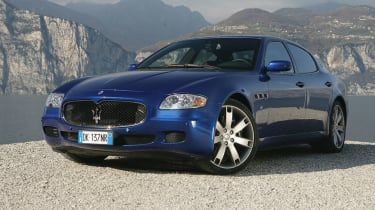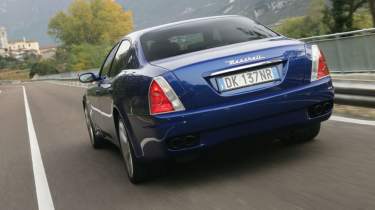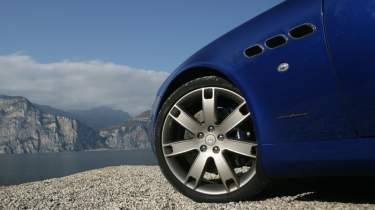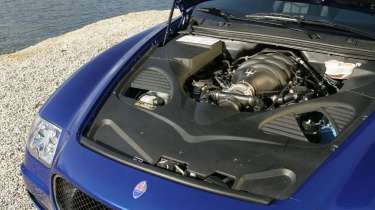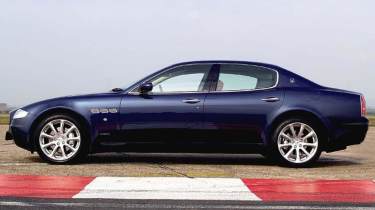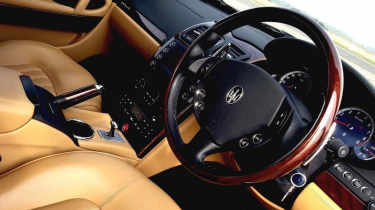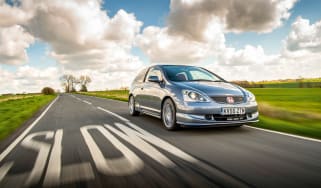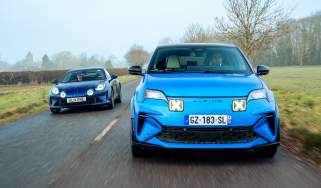Maserati Quattroporte V (2003 - 2012): review, specs and buying guide
The fifth-generation Quattroporte brought new levels of refinement and performance to Italy’s luxury saloon, helping it rival the very best in the segment
There are just two simple rules to follow if you want to live happily ever after with a fifth-generation Maserati Quattroporte. Rule 1, accept that it’s not going to be a cheap car to run and budget accordingly. And rule 2, find a car that’s been owned by someone who understood the importance of rule 1.
As Andy Heywood, MD of specialists McGrath Maserati, says: ‘Properly maintained, they’re a really nice car, the best of that generation of Maseratis – much nicer than the 4200 Coupe. You just have to find one where the owner has been meticulous about servicing. It’ll probably only cost you a thousand or so more than one that’s had a much harder life, and it’ll be worth every penny.’
> Maserati GranCabrio Trofeo 2024 review – a worthy Aston Martin DB12 Volante alternative?
The fifth-gen Quattroporte went on sale in May 2004. It used a 394bhp version of the Ferrari-developed 4.2-litre V8 from the 4200 Coupe, mated to a rear-mounted automated manual gearbox, known as Cambiocorsa in the 4200 but renamed DuoSelect for the QP. Maserati’s Skyhook adaptive damping came fitted as standard.
The Quattroporte was generally well received, its Pininfarina lines, superb chassis and soulful V8 earning special praise; not so much DuoSelect with its jerky, ponderous changes, particularly in auto mode, though its manners were gradually refined over the production run.
More reviews
Late 2005 saw the addition of the Executive GT version (more wood, more leather, more toys) and the harder-edged Sport GT (20-inch alloys, quicker shifts, sports exhaust, recalibrated Skyhook). In early 2007, Maserati finally bowed to the demand for a regular auto and a six-speed ZF unit became an option (taken up by over 70 per cent of buyers).
A year later came the Sport GTS, widely regarded as the pick of the range, with 20-inch wheels, uprated brakes, conventional damping and the auto ’box as standard. In the summer of 2008 engine capacity was expanded to 4.7 litres for the new S and updated Sport GTS, lifting power to 425 and 433bhp respectively. At the same time the range received a facelift that included a new front grille with vertical slats, and revised lights.
Any QP V is beautiful, charismatic and surprisingly driver-centric. But you need to approach ownership with eyes wide open. Here’s what you need to know…
What to pay
In 2025, £6000 is the bargain basement, usually populated by higher mileage cars with a less-than-watertight service history. Pre-facelift Sport and Executive GT models (noted by their mesh grills of either black or chrome respectively) vary in price wildly depending on condition, ranging from £8000 for a leggy Executive GT model and right up to £30,000 for a clean and sub 70,000-mile Sport GTS model.
What we said
‘Before driving the Quattroporte, the concept of a really big sporting luxury saloon had always seemed a spectacular contradiction in terms. All the evidence suggested you simply couldn’t make something that’s five metres long and weighs two tons handle properly or be remotely entertaining or involving.
‘Yet the QP really is an astonishingly accomplished machine when you let the bung out, displaying the kind of fluidity, precision and keenness to change direction that cars carrying 500kg less would struggle to match. Find the space and the confidence and you can fling the Quattroporte around like a supersized M5 thanks to steering that feeds you just enough information and an on-the-limit temperament that remains benign even with the most severe provocation. In terms of absolute A to B ability, it’s not only the best-sorted Maser chassis in years, but it completely redefines the standard for big-car dynamics.
‘The engine, too, loves this style of driving, punching with increasing power as the revs climb towards the 7600rpm red line, filling the cabin with an inspiring, guttural howl. The tragedy is the gearbox… DuoSelect in auto mode fails to slur a single shift as convincingly as a conventional torque-converter automatic.’ – Maserati Quattroporte first drive, March 2004 (evo 065)
A few years later in 2008, John Barker got behind the wheel of the Sport GT S: 'With 339lb ft and 396bhp up against almost 2000kg, it’s a quick car but not strikingly so. You really want a bit more grunt, too, not so much to deal more decisively with turbodiesels on the autostrada but to more fully exploit the chassis on a twisty road.
The steering feels a fraction light about the straight-ahead, requiring a bit more concentration at motorway speeds than expected, but guiding the Quattroporte into inviting corners it feels nicely weighty, smooth and direct. Indeed, there’s a satisfying poise and quality to the GT S’s demeanour, a consistency that encourages you to press on. A little more steering feel would be welcome, but when you do find a corner where you can push really hard, the GT S slips gently through cautioning mild understeer into progressive, catchable and gatherable oversteer.'
What to look out for
Engine
The 4.2 and 4.7 are essentially the same engine, just the bore and stroke differing. They’re largely bulletproof, says Andy Heywood at McGrath Maserati, provided they’re regularly serviced, which usually means annually. The big one comes every four years and costs around £2000 for an early car. As values fall, some owners cut corners, so look for a fully stamped and receipted service history.
‘The only issue is the camshaft variators, which can be noisy,’ says Andy. ‘You’ll hear it from a cold start before the oil’s pumped round. You may also hear random tapping noises as you accelerate from 2000 revs.’ Many owners have been able to get replacements and a later modification under warranty. ‘We priced it up at around five grand, so it’s worth asking!’ says Andy.
Transmission
The ZF auto is almost entirely trouble-free. With DuoSelect, shifts can feel a bit clunky, though it depends to an extent on how the clutch is set up. ‘The biting point can be set up so that it’s softer or harder, depending on preference,’ says Andy. ‘Also the ’box has fuzzy logic so will adapt to an owner’s driving style. If there are any gearchanging anomalies – say it’s jumping from second to fourth – it’s usually a sign the clutch is wearing out rather than a gearbox issue.
‘Clutch life is usually between 20,000 and 30,000 miles. The more town driving you do, the shorter its life. We usually change the flywheel as well, and the whole job is around £3000. So a recently replaced clutch is well worth having. A pre-purchase inspection with the proper Maserati diagnostics will read the remaining clutch life. We charge around £300 for an inspection.’
Suspension, steering, brakes
‘Wear in the ball joints is nowhere near as bad as on the 4200 Coupe, but it does happen,’ says Andy. ‘A QP weighs two tons, so it’s going to wear the suspension.’ Again, an inspection will show potential expense here, as will creaks or knocks on a test drive. Also check Skyhook is working if fitted, as replacement dampers are expensive, though it’s generally reliable on the Quattroporte.
‘The Quattroporte does eat brakes and tyres,’ says Andy. ‘Rear tyres might only last 6000 miles if you’re enjoying the car.’ Brakes are very expensive – over £500 for a set of front pads, while drilled discs are more than £1000 a pair – so again an inspection could easily pay for itself. ‘The 20-inch wheels look good but are a little bit more delicate,’ says Andy. ‘We’ve seen a few bent wheels from hitting potholes.’
Body, interior, electrics
No serious corrosion yet, so you’re checking for signs of accident damage. Make sure all the electrical gizmos work, and that the LCD screen in the centre of the dash hasn’t started to lose pixels – it’s fearsomely expensive to replace. Again, an inspection with Maserati diagnostics should throw up any electronic maladies.
‘I bought one’ - Ewen Clark
‘Following a string of other Maseratis, I bought my first Quattroporte V in 2007 and have owned one ever since. After three DuoSelect models, my current car is a GTS.
‘I have to say that very little has gone wrong with any of my QPs, and I’ve probably done about 70,000 miles in them combined. I’ve not had the GTS long, but certainly my last Quattroporte was far more reliable than my colleague’s Merc S-class!
‘The GTS did have a fault with the puddle-light in the door mirror – it would come on occasionally at random when the car was parked and end up flattening the battery. But that’s now fixed.
‘The QP is a car that ticks many boxes for me, being sufficiently fast and fun to be deemed a toy, but large and luxurious enough to carry the family. It’s also, to my eyes, the most stylish saloon car of recent years and with handling to match. Then there’s the aura that surrounds the Maserati marque, and the fun and knowledge available from the Maserati Owners Club and the Sports Maserati forum.
‘I’d advise potential owners to source a car from a reputable Maserati dealer, whether official or specialist, and at the very least arrange for an independent inspection. Being heavy cars, the brakes and tyres wear quickly, though the clutch on my first Quattroporte was still fine at 50,000 miles. The sporty side of DuoSelect worked for me, but for stop-start traffic the ZF auto is a better bet.
‘Overall, the QP is a surprisingly practical car that makes you feel good, whether on a mundane commute or a spirited hack. It’s not cheap to run – I get around 20mpg, and I reckon a realistic annual budget for servicing and consumables is £1500 – but with virtually no depreciation you’d have to search hard to find such pace and grace for less.’
Maserati Quattroporte V specs
| Engine | V8, 4244cc |
| Power | 394bhp @ 7000rpm |
| Torque | 333lb ft @ 4500rpm |
| Transmission | Six-speed sequential transaxle/ZF six-speed auto |
| Tyres | 245/40 ZR18 front, 285/35 ZR8 rear |
| Weight (kerb) | 1930kg |
| Power-to-weight | 207bhp/ton |
| 0-62mph | 5.2sec (claimed) |
| Top speed | 171mph (claimed) |
| Price new | £69,995 (2004) |
